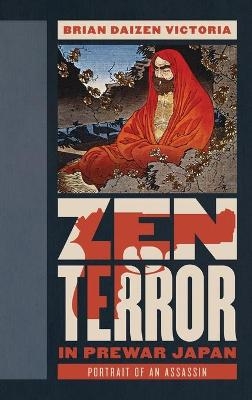
Zen Terror in Prewar Japan
Portrait of an Assassin
Seiten
2020
Rowman & Littlefield (Verlag)
978-1-5381-3166-4 (ISBN)
Rowman & Littlefield (Verlag)
978-1-5381-3166-4 (ISBN)
This book explores the profound influence of Zen Buddhist–linked terrorism in modern Japan. Brian Victoria follows a band of Zen Buddhist–trained adherents who ardently believed in their mission to carry out political assassinations in the 1930s, facilitating Japan’s transformation into a totalitarian state and setting the stage for Pearl Harbor.
Can Buddhism, widely regarded as a religion of peace, also contribute to acts of terrorism? Through an insider’s view of right-wing ultranationalism in prewar Japan, this powerful book follows a band of Zen Buddhist–trained adherents who ardently believed so. Brian Victoria, himself a Zen priest, tells the story of a group of terrorists who were responsible for the assassination of three leading political and economic figures in 1932 and 1933.
Victoria provides a detailed introduction to the religious as well as political significance of the group’s terrorist beliefs and acts, focusing especially on the life and times of the band’s leader, Inoue Nisshō. A deeply troubled youth, Inoue became a spy in Manchuria for the Japanese Army in 1909, where he encountered Zen for the first time. When he returned to Japan in 1921, he determined to resolve his deep spiritual discontent through meditation practice, which culminated in an enlightenment experience that resolved his long-term doubts. After engaging in “post-enlightenment training” under the guidance of Rinzai Zen master Yamamoto Gempō, Inoue began a program of training the “patriotic youth” who formed the nucleus of his terrorist band.
After the assassinations, Inoue and his band were sentenced to life imprisonment, only to be released just a few years later in 1940. Almost unbelievably, Inoue then became the live-in confidant of Prime Minister Konoe Fumimaro, a position he held through the end of WWII. In the postwar era, Inoue reinvented himself again as the founder and head of yet another band of ultranationalists known as the “National Protection Corps.” His eventful life came to an end in 1967.
Victoria concludes with an assessment of the profound impact of the assassinations, which culminated in Japan’s transformation into a totalitarian state and set the stage for Pearl Harbor. The author also examines the connection of Buddhism to terrorism more broadly, considering the implications for today’s Islamic-related terrorism.
Can Buddhism, widely regarded as a religion of peace, also contribute to acts of terrorism? Through an insider’s view of right-wing ultranationalism in prewar Japan, this powerful book follows a band of Zen Buddhist–trained adherents who ardently believed so. Brian Victoria, himself a Zen priest, tells the story of a group of terrorists who were responsible for the assassination of three leading political and economic figures in 1932 and 1933.
Victoria provides a detailed introduction to the religious as well as political significance of the group’s terrorist beliefs and acts, focusing especially on the life and times of the band’s leader, Inoue Nisshō. A deeply troubled youth, Inoue became a spy in Manchuria for the Japanese Army in 1909, where he encountered Zen for the first time. When he returned to Japan in 1921, he determined to resolve his deep spiritual discontent through meditation practice, which culminated in an enlightenment experience that resolved his long-term doubts. After engaging in “post-enlightenment training” under the guidance of Rinzai Zen master Yamamoto Gempō, Inoue began a program of training the “patriotic youth” who formed the nucleus of his terrorist band.
After the assassinations, Inoue and his band were sentenced to life imprisonment, only to be released just a few years later in 1940. Almost unbelievably, Inoue then became the live-in confidant of Prime Minister Konoe Fumimaro, a position he held through the end of WWII. In the postwar era, Inoue reinvented himself again as the founder and head of yet another band of ultranationalists known as the “National Protection Corps.” His eventful life came to an end in 1967.
Victoria concludes with an assessment of the profound impact of the assassinations, which culminated in Japan’s transformation into a totalitarian state and set the stage for Pearl Harbor. The author also examines the connection of Buddhism to terrorism more broadly, considering the implications for today’s Islamic-related terrorism.
Brian Daizen Victoria, a fully ordained Sōtō Zen priest, is currently a senior research fellow at the Oxford Centre for Buddhist Studies. His publications include Zen at War (Rowman & Littlefield, 2006) and Zen War Stories (2003).
| Erscheinungsdatum | 10.05.2021 |
|---|---|
| Reihe/Serie | Asian Voices |
| Vorwort | James Mark Shields |
| Verlagsort | Lanham, MD |
| Sprache | englisch |
| Maße | 162 x 233 mm |
| Gewicht | 653 g |
| Themenwelt | Geisteswissenschaften ► Geschichte ► Regional- / Ländergeschichte |
| Geisteswissenschaften ► Religion / Theologie ► Buddhismus | |
| Sozialwissenschaften ► Politik / Verwaltung | |
| ISBN-10 | 1-5381-3166-8 / 1538131668 |
| ISBN-13 | 978-1-5381-3166-4 / 9781538131664 |
| Zustand | Neuware |
| Haben Sie eine Frage zum Produkt? |
Mehr entdecken
aus dem Bereich
aus dem Bereich
Erinnerungen
Buch | Softcover (2024)
Pantheon (Verlag)
CHF 22,40


